2015年12月大学英语四级作文题目:留学利弊
出国留学利弊英语作文

出国留学利弊英语作文1Studying abroad is good or badRecent years, more and more Chinese people have chosen tostudy abroad. To this tendency, some people think it is not good, as most of the overseas learners do not come back, whereas I hold a different opinion.In my opinion, it is a good thing that more Chinese people go abroad. There are three reasons. First, the overseas learners can improve their ability through the study. They can grasp advanced technologies and their language ability can be improved as well. Second, with the rapid development of China, more and more overseas learners will choose come back, using their abundant knowledge studied abroad to serve for the motherland. The third, the government and most domestic enterprises are willing to provide favorable treatments to attract them to come back.Although some do not want to come home, we are glad to seethat there are more overseas learners chosen to work at home than before. For the above reasons, I think it is not a bad thing for more and more Chinese study abroad.2Studying abroad is good or badWhen you choose to study abroad, you are making an investment for your future. You will be looing for a qualification that will encance your career prospects, and a word-class international university will support you in your studies.You will be taught by experts in each subject, with national and international research reputations so you will benefit fromthe latest thinking in all subject areas.Is this what you want?3Studying abroad is good or badThe advantages of going abroad to study:1. A perfect chance to broad our horizon. We will have the chance to get close to different culture and different people. During our stay in other countries, we can view exoticscenery and different values of other people, which will deeply affect our future value about the world and personal life, as well as job expectation.2. We way get rid of some bad habits, such as laziness,lacking of the concept of time. Our moral ideas and some bad habits will also be improved, for that we represent our own country when we’re abroad.3. A good test for our courage, independence and perseverance. Going abroad can be a very good training to enhance goodspirit in hardship.4. The education system of developed country is more advanced than ours. We can get more knowledge in a better-equipped educational environment.5. Practice an authentic language. The best way to learn a language well is to get involved in its language environment and experience it by ourselves.6. It’s hard to find an ideal job with a bachelor’s degree. Going abroad for a further education to obtain a gold-plated diploma is a better choice than having postgraduate study domestically.The disadvantages of going abroad to study:1. It is a kind of gambling, which st akes our youth, parents’ savings, and future. We will feel a lot of pressure, and haveto count on ourselves.2. The foreign life can be really different than we imagine.We will have to be adapted to completely new life styles, new social environments and new people. Also, be aware of facing culture shock everywhere.3. The high consumption often makes us having financial problem.4. We will find it hard to get truly involved into foreign society and local students’ lives.5. Foreign universities mostly hold "wide into severe piece" policy. We will find that it is so difficult to graduate,even sometimes we may think of giving up.6. The hardest obstacle to overcome is the deep "homesickness". We will know the feeling when calling mom and saying "mom, every thing is perfect. Don't worry,” whilecrying into tears!7. When we get back, we will find that our friends alreadyhave our dreamed jobs and families. What we have, however, is just a diploma, and we have to start from scratch... Bummer!4Studying abroad is good or badAdvantages:It widens students' knowledge and horizons, meanwhile cultivats their independence and personalities.learn advanced knowledge and experience. Providesopportunities to students, who can learn advanced management experience. Then students have to deal with many problems whey they study abroad, thdy have to learn how to be accustomed to a new environment and how to get well with the teachers and classmates.By communicating with foreign students, they will see the differences from their own. Finally, can provide a good language environment and make it easy to pick up a language.Disadvantages: students will confronted with many phychological problems. they feel lonely and helpness in a new environment.Futhermore, the tuition is too much , which is a heavy financial burden to the average people. Not only that, students may also experience homesickness when away from their families so long.5留学的好处英语作文There are some advantages and disadvantages in studying abroad. In my opinion, I'm in favour of studying abroad.First of all, If we live with a local family, we will communicate with each other. In this way, we have more chances to practise speaking English. Besides, we can learn more aout Western culture and customs. What's more, we will have a good job with diploma in the future. However, some people are against studying abroad. In their opinion, first, studying abroad is too expensive. In addition, Since it's too far away and we aren't familiar with the environment. We will feel lonely. What's more, Since we 're unfamiliar with Western culture and customs, we may be not used to the food, the way of communication and teaching methods and so on.。
评价出国留学的利弊英语作文

评价出国留学的利弊英语作文The Pros and Cons of Studying Abroad.Studying abroad presents a unique opportunity for individuals to expand their horizons, gain cross-cultural understanding, and pursue academic and personal growth. However, this experience is not without its challenges and drawbacks. In this essay, I will explore the benefits and costs of studying abroad, discussing both the positive and negative aspects of this international educational endeavor.Benefits of Studying Abroad.1. Cultural Immersion: Studying abroad offers an unparalleled opportunity to immerse oneself in a new culture. Living and learning in a foreign country exposes students to different values, traditions, and ways of life. This cultural immersion enhances their understanding of the world and cultivates a more global perspective.2. Language Acquisition: For many students, studying abroad is the best way to learn a new language. Immersionin a foreign language environment accelerates language acquisition and improves fluency. This skill is invaluable in today's interconnected world, where proficiency in multiple languages can open doors to career opportunities and cultural exchanges.3. Personal Development: Studying abroad promotes personal growth and development. Living independently in a foreign country requires students to adapt to new environments, solve problems, and make decisions. These experiences foster resilience, self-confidence, and interpersonal skills.4. Expanded Academic Options: Studying abroad often provides access to a broader range of academic programs and courses than may be available domestically. Students can explore fields of study that are unique or more advanced than those offered at their home institutions.5. Professional Networking: Studying abroad offersstudents the chance to build professional networks with peers and mentors from around the globe. These networks can be invaluable in future career development, providing access to job opportunities, internships, and mentorship programs.Costs of Studying Abroad.1. Financial Burden: Studying abroad can be a significant financial investment. Tuition fees, living expenses, and travel costs can be prohibitively expensive for many students and families. While scholarships and grants may offset some of these expenses, the financial burden can still be substantial.2. Cultural Clash: While cultural immersion is a significant benefit of studying abroad, it can also lead to cultural clash. Differences in values, norms, and expectations can be jarring for students who are not accustomed to them. Navigating these differences can be challenging and emotionally draining.3. Isolation and Homesickness: Studying abroad often requires students to leave their families and friends behind. This can lead to feelings of isolation and homesickness, particularly during the initial adjustment period. Students must learn to cope with these emotions and find ways to connect with their new environment.4. Language Barrier: While studying abroad is an excellent opportunity to learn a new language, the language barrier can be a significant challenge. Communication difficulties can affect academic performance, social integration, and day-to-day life. Students must be willing to put in the effort to overcome this barrier through practice and language courses.5. Uncertainty and Risk: Studying abroad involves a degree of uncertainty and risk. Political instability, natural disasters, and other unexpected events can disrupt study plans and affect student safety. While most institutions strive to mitigate these risks, students must be prepared to navigate unexpected challenges and make informed decisions about their safety and well-being.In conclusion, studying abroad offers numerous benefits that can transform students' academic and personal lives. However, it is not without its costs and challenges. Students considering this option must carefully weigh the pros and cons, considering their financial situation, personal goals, and readiness to embrace the unique challenges and opportunities of studying abroad.。
留学的优点和缺点英文四级作文
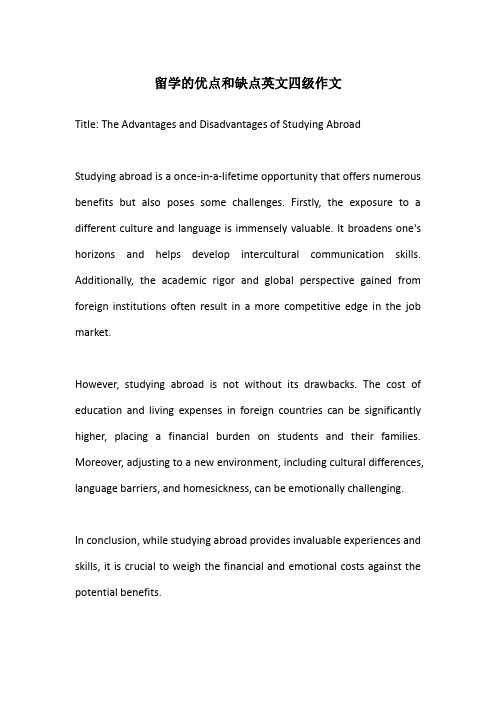
留学的优点和缺点英文四级作文Title: The Advantages and Disadvantages of Studying AbroadStudying abroad is a once-in-a-lifetime opportunity that offers numerous benefits but also poses some challenges. Firstly, the exposure to a different culture and language is immensely valuable. It broadens one's horizons and helps develop intercultural communication skills. Additionally, the academic rigor and global perspective gained from foreign institutions often result in a more competitive edge in the job market.However, studying abroad is not without its drawbacks. The cost of education and living expenses in foreign countries can be significantly higher, placing a financial burden on students and their families. Moreover, adjusting to a new environment, including cultural differences, language barriers, and homesickness, can be emotionally challenging.In conclusion, while studying abroad provides invaluable experiences and skills, it is crucial to weigh the financial and emotional costs against the potential benefits.翻译:留学的优点和缺点留学是一次千载难逢的机会,它提供了许多好处,但同时也带来了一些挑战。
出国留学利弊英文作文
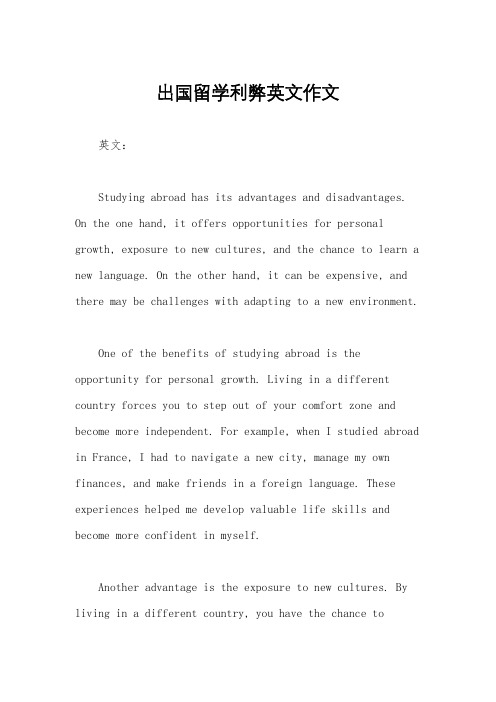
出国留学利弊英文作文英文:Studying abroad has its advantages and disadvantages. On the one hand, it offers opportunities for personal growth, exposure to new cultures, and the chance to learn a new language. On the other hand, it can be expensive, and there may be challenges with adapting to a new environment.One of the benefits of studying abroad is the opportunity for personal growth. Living in a different country forces you to step out of your comfort zone and become more independent. For example, when I studied abroad in France, I had to navigate a new city, manage my own finances, and make friends in a foreign language. These experiences helped me develop valuable life skills and become more confident in myself.Another advantage is the exposure to new cultures. By living in a different country, you have the chance toimmerse yourself in a new way of life and gain a deeper understanding of the world. For instance, during my time in Japan, I was able to participate in traditional tea ceremonies, visit ancient temples, and learn about the customs and traditions of the Japanese people. These experiences broadened my perspective and enriched my lifein ways that would not have been possible if I had stayedin my home country.However, studying abroad also has its drawbacks. One of the main disadvantages is the cost. Tuition, living expenses, and travel can add up to a significant financial burden. Additionally, there may be unexpected expenses, such as medical emergencies or visa issues, that canfurther strain your budget. When I studied in Australia, I had to carefully budget my money and make sacrifices in order to afford my living expenses. It was a challenging experience that taught me the value of financial responsibility.Another downside is the challenge of adapting to a new environment. Language barriers, cultural differences, andhomesickness can make the adjustment period difficult. For example, when I first arrived in Germany, I struggled to communicate with locals and felt isolated from my friends and family back home. It took time and effort to overcome these obstacles and feel at home in my new surroundings.In conclusion, studying abroad has both advantages and disadvantages. It offers opportunities for personal growth and cultural enrichment, but it can also be expensive and challenging. Despite the drawbacks, the experience of studying abroad is invaluable and has the potential to positively impact your life in countless ways.中文:出国留学有其利与弊。
出国留学好处和弊端英语作文
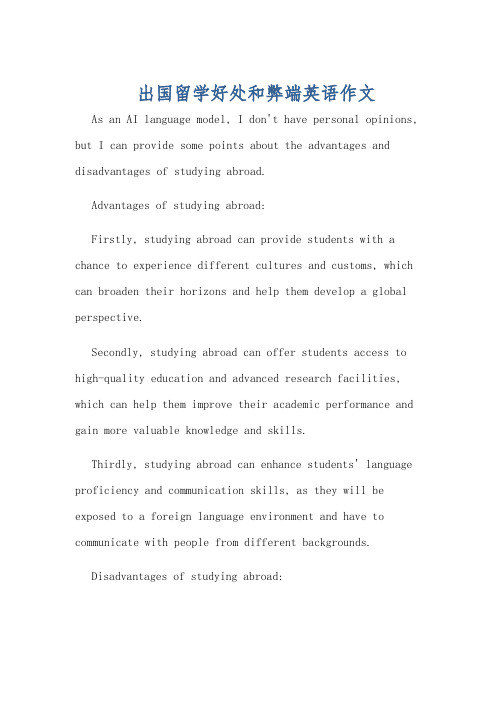
出国留学好处和弊端英语作文As an AI language model, I don't have personal opinions, but I can provide some points about the advantages and disadvantages of studying abroad.Advantages of studying abroad:Firstly, studying abroad can provide students with a chance to experience different cultures and customs, which can broaden their horizons and help them develop a global perspective.Secondly, studying abroad can offer students access to high-quality education and advanced research facilities, which can help them improve their academic performance and gain more valuable knowledge and skills.Thirdly, studying abroad can enhance students' language proficiency and communication skills, as they will be exposed to a foreign language environment and have to communicate with people from different backgrounds.Disadvantages of studying abroad:Firstly, studying abroad can be very expensive,including tuition fees, accommodation, food, transportation, and other expenses, which can put a heavy financial burden on students and their families.Secondly, studying abroad can be challenging, asstudents may face various difficulties and obstacles, such as cultural shock, language barriers, homesickness, and academic pressure, which can affect their mental health and well-being.Thirdly, studying abroad may also pose risks tostudents' safety and security, as they may encounterdifferent social and political situations, such as discrimination, racism, violence, and terrorism, which can endanger their personal safety and health.总之,出国留学有其利有其弊,需要学生根据自身情况和需求来做出决策,并做好充分的准备和规划,以克服各种挑战和迎接各种机遇。
出国留学的好处和坏处英语作文
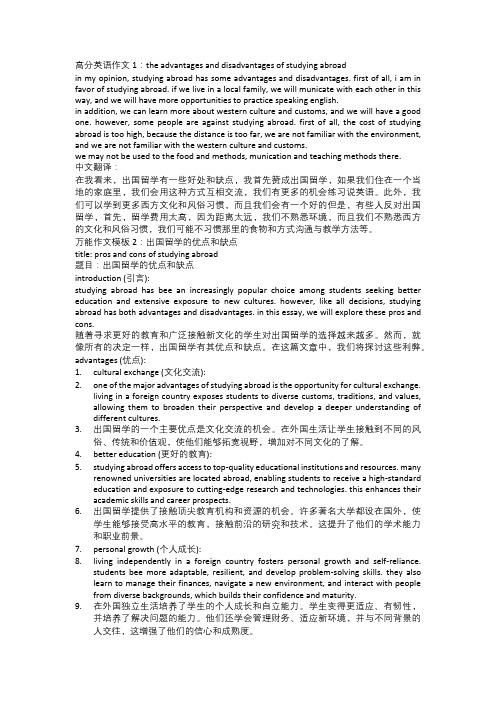
高分英语作文1:the advantages and disadvantages of studying abroadin my opinion, studying abroad has some advantages and disadvantages. first of all, i am in favor of studying abroad. if we live in a local family, we will municate with each other in this way, and we will have more opportunities to practice speaking english.in addition, we can learn more about western culture and customs, and we will have a good one. however, some people are against studying abroad. first of all, the cost of studying abroad is too high, because the distance is too far, we are not familiar with the environment, and we are not familiar with the western culture and customs.we may not be used to the food and methods, munication and teaching methods there.中文翻译:在我看来,出国留学有一些好处和缺点,我首先赞成出国留学,如果我们住在一个当地的家庭里,我们会用这种方式互相交流,我们有更多的机会练习说英语。
出国留学有利有弊 英语作文四级
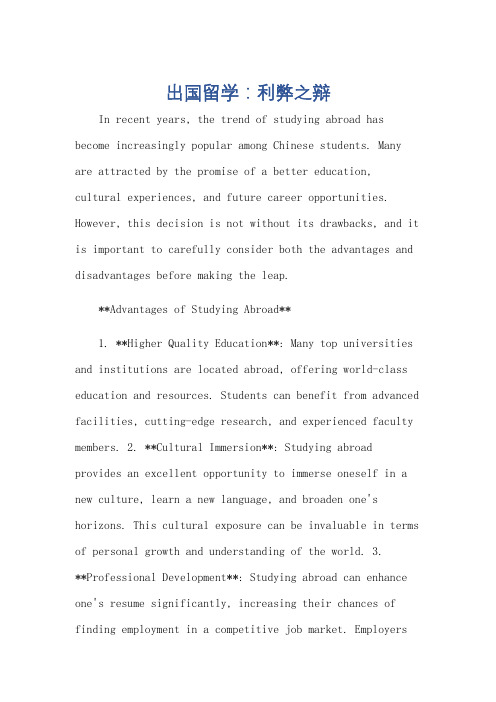
出国留学:利弊之辩In recent years, the trend of studying abroad has become increasingly popular among Chinese students. Many are attracted by the promise of a better education,cultural experiences, and future career opportunities. However, this decision is not without its drawbacks, and it is important to carefully consider both the advantages and disadvantages before making the leap.**Advantages of Studying Abroad**1. **Higher Quality Education**: Many top universities and institutions are located abroad, offering world-class education and resources. Students can benefit from advanced facilities, cutting-edge research, and experienced faculty members.2. **Cultural Immersion**: Studying abroad provides an excellent opportunity to immerse oneself in a new culture, learn a new language, and broaden one's horizons. This cultural exposure can be invaluable in terms of personal growth and understanding of the world.3.**Professional Development**: Studying abroad can enhance one's resume significantly, increasing their chances of finding employment in a competitive job market. Employersoften value the international experience and skills gained abroad. 4. **Networking Opportunities**: Studying abroad opens up a world of networking opportunities. Students can meet people from diverse backgrounds, create meaningful relationships, and build a global network that can be beneficial in their future careers.**Disadvantages of Studying Abroad**1. **High Financial Cost**: Studying abroad can be expensive, with tuition fees, accommodation, living expenses, and travel costs all adding up. This financial burden can be a significant deterrent for many students.2. **Cultural Barriers**: While cultural immersion is a benefit, it can also present challenges. Language barriers, differences in customs and traditions, and adjustment to a new way of life can be stressful and difficult to overcome.3. **Isolation and Homesickness**: Being in a foreign country can lead to feelings of isolation and homesickness. The lack of familiar faces, places, and routines can be challenging for some students.4. **Job Prospects**: While studying abroad can enhance one's resume, it does not guarantee employment upon graduation. The job market can becompetitive, and finding a suitable job can be challenging, especially if the student opts to stay in the host country. **Conclusion**Studying abroad offers numerous benefits but also comes with its challenges. It is crucial for students tocarefully consider their goals, financial situation, and personal readiness before making the decision to study abroad. By doing so, they can ensure that they make the most of this opportunity and gain valuable experiences that will benefit them in the long run.**出国留学:利弊之辩**近年来,出国留学已成为中国学生中越来越流行的趋势。
国外留学的好坏处英语作文

国外留学的好坏处英语作文English:Studying abroad has both advantages and disadvantages. One of the main benefits is the opportunity to immerse yourself in a new culture and language, which can broaden your horizons and enhance your global perspective. Additionally, studying abroad allows you to gain independence, self-reliance, and problem-solving skills as you navigate a foreign environment. On the other hand, one of the drawbacks of studying abroad is the potential for homesickness, cultural shock, and feeling of loneliness, especially if you are far away from family and friends. Moreover, studying abroad can be expensive, and there may be challenges in adapting to a new educational system and different teaching methods. Overall, studying abroad can be a life-changing experience that offers personal and academic growth, but it also comes with its own set of challenges and difficulties.中文翻译:出国留学有其优点和缺点。
- 1、下载文档前请自行甄别文档内容的完整性,平台不提供额外的编辑、内容补充、找答案等附加服务。
- 2、"仅部分预览"的文档,不可在线预览部分如存在完整性等问题,可反馈申请退款(可完整预览的文档不适用该条件!)。
- 3、如文档侵犯您的权益,请联系客服反馈,我们会尽快为您处理(人工客服工作时间:9:00-18:30)。
2015年12月大学英语四级作文题目:留学利弊
题目:
1. 出国留学有很多好处
2. 出国留学也会遇到很多难题
3. 你的选择
例句:
出国留学的好处:
接触到全新的想法和趋势,增加知识,拓宽视野
Being exposed to entirely new ideas and trends,they can enrich their knowledge and expand their horizons. 在国外生活,更快地掌握外遇
by living and studying in a foreign country, one can improve his foreign language much faster than at home. 减少对父母的依靠
A great gift a parent can give is to let a child spread his /her wings and be independent
Reduce their dependence on their parents
出国留学遇到的困难:语言难,沟通难learning a foreign language and communicating smoothly with the local people is far from an easy thing at the outset for most people. 适应当地饮食,习俗,思想和气候
It also takes time for students to adapt themselves to a new diet,custom,set of ideas and even the climate。
